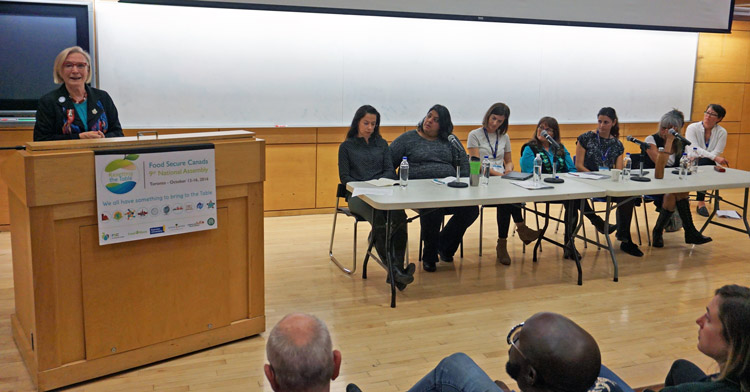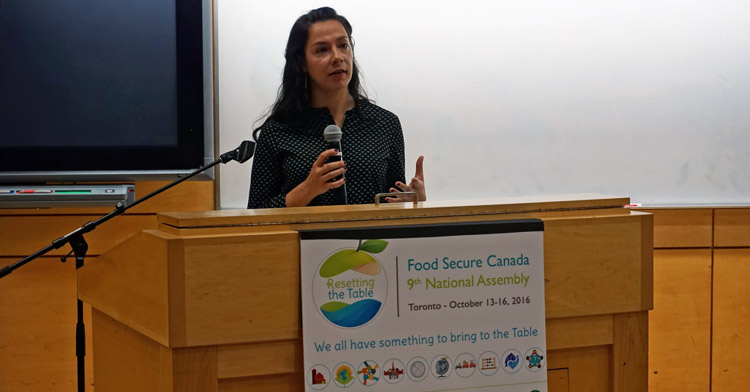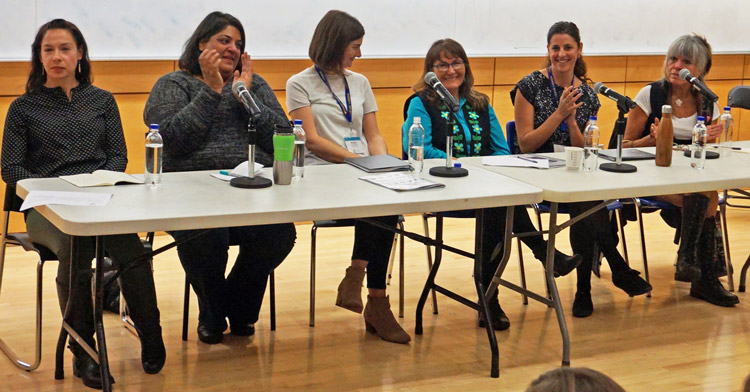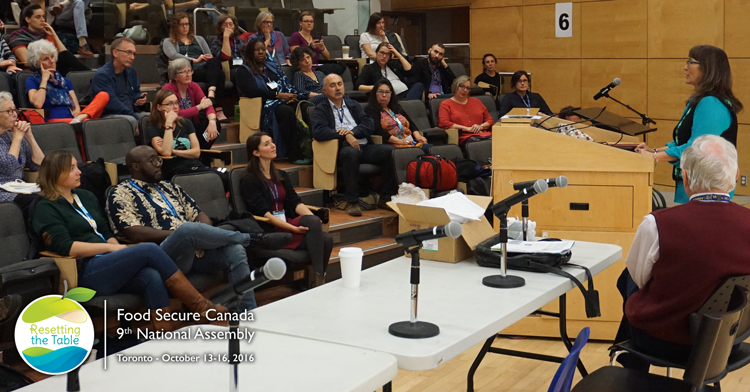Harvesting solutions Sunday at Resetting the Table – Highlights of the day
What better way to celebrate World Food Day 2016 than by listening to Dr. Carolyn Bennett, Minister of Indigenous and Northern Affairs, tell the Canadian food movement that Nutrition North needs to be “completely overhauled” and that developing the new national food policy needs a “holistic…whole of government approach”? Her keynote plenary speech was one of the highlights of a packed Sunday morning agenda, where the voices of Indigenous women also figured prominently.

Before the final plenary got started, the Assembly honoured its Cathleen Kneen Award winners. The prize is named for one of Food Secure Canada’s (FSC) founders. Her widower and fellow sheep farmer and activist Brewster Kneen made the presentations. Abra Brynne and Norma Kassi, the 2016 winners, are two women who show extraordinary leadership and embody the spirit of the food movement in their communities and territories.
Sunday morning’s plenary, “Building the Food System We Want”, was a rich, emotional and powerful closing event that kept a strong focus on Indigenous food sovereignty. In addition to the Minister, eight other leaders, all women, contributed their impressions and ideas about how to move forward as a movement after four days of intense work.
FSC's own Diana Bronson, thanked later by Minister Bennett in a tweet for her “truly important leadership”, chaired the plenary. The first speaker was Lisa Barnoff, Dean of the Faculty of Community Services at Ryerson who, recalling that FSC was founded at Ryerson 15 years ago, congratulated the movement on its growth and reiterated the University’s ongoing commitment to wholesome, sustainable and affordable institutional food.
Dawn Morrison of the Working Group on Indigenous Food Sovereignty was invited to share some of the deliberations of the Indigenous Circle that met throughout the Assembly. While stressing that she was not representing the huge diversity of the 98 nations, Dawn highlighted some key points, thanking FSC for putting these issues “at the heart of the Assembly.” Struggles for land and water and the onslaught of extractive industries are huge issues. Points of complementarity between Indigenous peoples, including those coming to Canada as migrant farm workers, and movements like La Via Campesina and the National Farmers Union were noted. She ended with a call to action for solidarity with front-line struggles from non-Indigenous peoples and a push for the government to do the right thing.
The Honourable Carolyn Bennett thanked Dawn for her remarks, reiterating that “the stewardship of the land and the water, the sustainability of the land and the water was the Indigenous way.” She said she now understood that a leadership style that is “asking not telling” was not only feminist but above all an Indigenous approach. She emphasized that lived experience coupled with expertise is more than the sum of its parts. By putting together those on the frontline with scholars – as at the Assembly – we can begin to build institutions that work, not just programs. It’s about harvesting solutions from those who actually know what is going on.

Noting that as the climate changes, so must food and agriculture, the Minister highlighted some of the inspiring Indigenous leadership that she has witnessed from coast to coast to coast. To immense appreciation from audience members, she mentioned: Carol Anowek in Iqaluit drawing attention to hunters depressed by their inability to feed their communities the traditional way; Chief Alatini from the Yukon reintroducing fishing and gathering skills; Nellie Cournoyea netting whitefish in Tuktoyaktuk; Mary Simon blueberry picking with the youth in Kuujjuaq; Rick Laliberté harvesting tiny cranberries; Tina Keeper farming in Garden Hill, Southwestern Ontario; the work of Food First Newfoundland and Labrador; and the local initiatives in Nunatsiavut and Goose Bay regions. Summing up, she said this is the Canadian tradition “whether it's potlatch or potluck, sharing food is the way we do it.”
The Minister made important policy statements. As a doctor herself, she addressed the consequences of the replacement of traditional diets, asserting the “need to deal with chronic disease not as a band aid after the fact … it is about the medicine wheel instead of the medical model.” On the Northern Contaminates Program she underlined the importance of eliminating the contaminants, rather than just telling people that they cannot eat traditionally harvested foods. As regards the consultation on Nutrition North, she welcomed FSC’s report Paying for Nutrition and agreed that the challenges facing families are real and completely unacceptable. She appealed for help in finding solutions and confirmed that it needs to be completely overhauled. Finally, she recognized that the new national food policy needs a “holistic … whole-of-government approach.”
Diana Bronson thanked Minister Bennett very warmly for a speech that was “music to our ears.” She went on to introduce five panelists who would speak, very briefly in the time remaining, about what they were taking away from FSC’s 9th Assembly.

Tabitha Martens of the University of Manitoba was visibly moved as she explained that she had found the Assembly emotional, not least because her family was eroded by the impact of residential schools. She is a Cree woman of mixed ancestry with her feet in the two worlds of her tradition and academia. She thanked Minister Bennett for acknowledging missing and murdered Indigenous women. Rather than that being a separate issue, she explained, “I would say that missing and murdered Indigenous women is in fact, an Indigenous food sovereignty issue, and it is because the first wave of documented sexual abuse to Indigenous women happened by Indian agents because women were doing everything in their power to feed their families when the rations were not enough and when the rations were rancid, and that's not okay.” She drew more applause when she remarked that Indigenous food sovereignty was a big theme of the conference and that Indigenous people were well represented: “It is about time. It is absolutely and positively about time.” She ended by inviting everybody to come to Indigenous kitchen tables, where all decisions get made.
Joshna Maharaj, chef, said how incredibly inspired she had been by the Assembly. A very important idea for her is the intersectionality of food, “Good food policy inherently means good agriculture policy, good health policy, good environment policy, good trade policy”. Through food we can be connected to our Northern communities. Together we can build a future with a more sustainable, resilient, inclusive food system.
For Kristie Jameson, Executive Director of Food First NL, it all comes back to the conversation on a national food policy, both a big challenge and an opportunity. Firstly, it will be crucial to balance inclusiveness with the risk of being so broad that it leads to inaction. Secondly, food is deeply personal and what works in Nunatsiavut will not work in Toronto. A core principle is that communities know best. One way forward then can be a platform that has broad goals, with local, provincial and regional mechanisms for implementation. At the same time, there can be some opportunities for implementation at the national level, such as a national school food program or a national sugar-sweetened beverage tax (but with provincial disbursements of the funds raised).

Norma Kassi, Arctic Institute of Community-Based Research, thanked Minister Bennett for hanging out with Indigenous peoples, which creates confidence in moving forward in this era of reconciliation. She emphasized that Northerners want to be self-sufficient and to develop their own solutions, with resources to move forward and implement their strategies. Youth mental health is improved by valuing their perspectives and their engagement. She ended by stressing the resiliency of Northern communities, which have lived through challenges over generations.
Jane Rabinowicz, USC, explained that for her too, the conference had been emotional, generating feelings of intimacy even in a gathering of hundreds. For her “the source of that intimacy is people speaking from their experience, from their truth, and from their lives. And I think that it takes a certain amount of courage to do that. And so I want to express my appreciation to everyone over the course of this conference who spoke from their truth and their experience and their wisdom.” She added that there were moments when people spoke such fundamental truths that the collective wisdom of the room increased. Listening to Indigenous leaders has changed the way that she worked and she urged others to consider how they too can act in service of the movement and be open to transformation, including stepping away when that is the most powerful thing to be done.
After such powerful presentations, Diana Bronson concluded that “I think it’s all been said” and the delegates enjoyed a final lunch of networking and friendship.
- Log in to post comments


